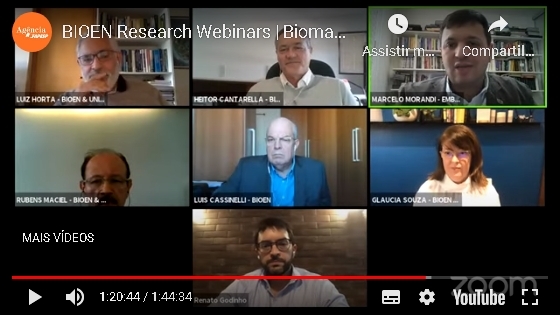

Novel forms of societal behavior and political priorities during the coronavirus crisis may become permanent, creating even more favorable conditions for increased use of renewables, as discussed in a webinar hosted by the FAPESP Bioenergy Research Program.
Novel forms of societal behavior and political priorities during the coronavirus crisis may become permanent, creating even more favorable conditions for increased use of renewables, as discussed in a webinar hosted by the FAPESP Bioenergy Research Program.
Novel forms of societal behavior and political priorities during the coronavirus crisis may become permanent, creating even more favorable conditions for increased use of renewables, as discussed in a webinar hosted by the FAPESP Bioenergy Research Program.

Novel forms of societal behavior and political priorities during the coronavirus crisis may become permanent, creating even more favorable conditions for increased use of renewables, as discussed in a webinar hosted by the FAPESP Bioenergy Research Program.
By André Julião | Agência FAPESP – The societal changes under way because of the COVID-19 pandemic may cause permanent transformations that include the faster introduction of bioenergy. This was one of the conclusions of the FAPESP Research Webinar held on June 25 to discuss “Biomass and Sustainability.”
This was the first webinar organized by the FAPESP Bioenergy Research Program (BIOEN). It was live streamed and can still be watched on YouTube.
“The pandemic has imposed rapid changes that may become permanent – changes in the behavior of society, the profile of public spending, political priorities, and the functioning of the economy,” Marco Antonio Zago, President of FAPESP, said in his opening remarks.
“After the end of this acute period, the result may be seen to have been the acceleration and concentration in a very short time of global changes that were already under way. One of these trends is the substitution of non-renewable energy sources with alternatives such as bioenergy.”
For Luiz Eugênio Mello, FAPESP’s Scientific Director, BIOEN is clearly a success, having funded more than 400 projects and over 200 small enterprises since its inception more than ten years ago. Beyond knowledge production that contributes to the development of the field, he noted, the main challenge faced by the program is to ensure that projects result in the implementation of bioenergy applications.
“We all know about the discussions between Nikola Tesla and Thomas Edison about the best way to store energy and convey it to consumers. This shows that the best solution doesn’t always win. The positioning of the different players influences the outcome. We want this event to help make sure the best solutions prevail,” Mello said.
Brazilian leadership
BIOEN’s coordinator Glaucia Mendes Souza recalled that the program started in 2009 and that bioenergy is increasingly seen as an essential component of Brazil’s energy mix, in which renewables now account for 42%. “Bioenergy must be expanded if we are to mitigate the adverse impacts of climate change and drive sustainable development. It’s the only available option to replace fossil fuels in many sectors of the economy,” she said.
Other than Brazil, she added, in no other country with a population of more than 60 million inhabitants do renewables account for more than 40% of the energy mix. The key components that have contributed to this achievement include Brazil’s longstanding tradition of producing sugar, its hydropower production capacity, and, importantly, sugarcane bioethanol and sugarcane bioelectricity as well as increasing amounts of biodiesel.
“Another key component I must stress is our strong science on this subject,” Souza said. “Brazil is the leader in publications in this field. We’re very grateful to the robust community of scientists who have worked on this topic for so many years.”
According to Souza, an important outcome of the BIOEN Program has been to increase networking among researchers and collaboration in transdisciplinary studies, directly impacting the quality of public policy for the sector. She mentioned the research that led to the development of the first flex-fuel engine in Brazil in 2003 and the advances in genomics that led to publication late last year of the most complete genome sequence of commercial sugarcane to date (read more at agencia.fapesp.br/32089/).
The other members of BIOEN’s steering committee also took part in the webinar. They are Luis Cassinelli, Rubens Maciel Filho, Heitor Cantarella, and Luiz Augusto Horta Nogueira.
The other speakers were Stephen Long, professor of plant biology and crop sciences at the University of Illinois, Urbana-Champaign (UIUC) in the US; Renato Godinho, chair of Biofuture Platform and a career diplomat in Brazil’s Foreign Affairs Ministry; and Marcelo Morandi, a researcher in the environment unit of the Brazilian Agricultural Research Corporation (EMBRAPA). The complete webinar can be watched at www.fapesp.br/14294.
Republish
The Agency FAPESP licenses news via Creative Commons (CC-BY-NC-ND) so that they can be republished free of charge and in a simple way by other digital or printed vehicles. Agência FAPESP must be credited as the source of the content being republished and the name of the reporter (if any) must be attributed. Using the HMTL button below allows compliance with these rules, detailed in Digital Republishing Policy FAPESP.





